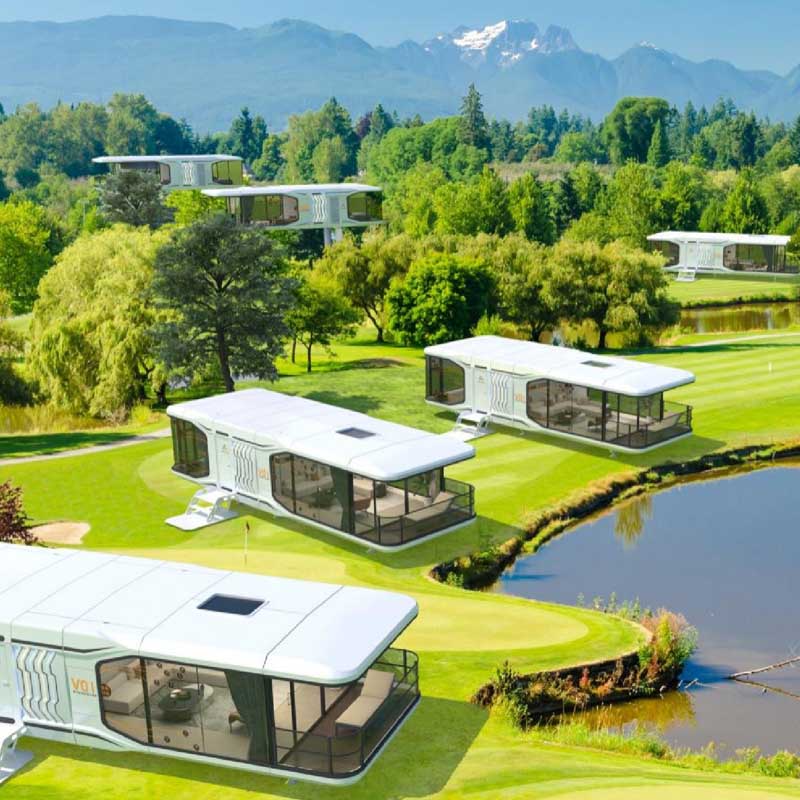Capsule houses, as a high-density and low-cost spatial solution, have gradually emerged in European and American countries in recent years. However, its legality is constrained by multiple laws and regulations such as building codes, fire safety, and hygiene standards. This analyzes the main compliance challenges faced by capsule house operations based on the legal frameworks of European and American countries.

1、 Building Regulations: The Core Contradiction between Space and Safety Design
The building regulations in European and American countries generally have strict requirements for the minimum area, floor height, and escape routes of residential spaces. For example:
The International Building Code (IBC) in the United States requires a minimum net area of 70 square feet (approximately 6.5 square meters) for house rooms, and a ceiling height of not less than 7.5 feet (approximately 2.3 meters). Traditional capsule cabins (usually 4-6 square meters) may be considered "non residential units" due to non-compliance with standards and require special use permits.
The European Union's Building Products Regulation (CPR) emphasizes the "livability" of spaces, and some countries (such as Germany) require accommodation to provide natural lighting and ventilation facilities, which may not be met by enclosed capsule designs.
Solution: Some operators define capsules as "temporary rest cabins" rather than informal guest rooms to avoid living space restrictions, but still need to comply with safety standards for public areas.
2、 Fire safety: a dual test of escape and material compliance
The high-density layout of capsule houses may increase the risk of fire, therefore stricter fire safety requirements need to be met:
National Fire Protection Association (NFPA) standards:
Each sleeping compartment must be made of flame-retardant materials and equipped with independent smoke detectors.
The width of the escape route must be maintained at least 36 inches (approximately 0.9 meters) and must not be obstructed by capsule structures.
EU EN 13501 fire protection standard:
The cabin material needs to reach at least B-S1, D0 level flame retardant rating.
Emergency exit signs and emergency lighting systems must cover all areas and comply with the European Fire Directive (2001/95/EC).
3、 Health and Public Health Licensing
European and American countries require accommodation facilities to provide sanitary facilities that meet standards, and capsule houses often face scrutiny due to the "shared bathroom" model
The US Department of Health requires at least one shower and two bathrooms for every 10 guests.
The UK's Housing Health and Safety Rating System (HHSRS): If there is a lack of natural ventilation in the capsule compartment, it may be classified as a "risk of moisture and mold", resulting in an unsatisfactory rating.
Trend: The new generation of capsule houses improves compliance by adding independent bathroom modules (such as Pod style design), but the cost significantly increases.
4、 Zoning planning and short-term leasing regulations
The legality of capsule houses also depends on the land use zoning of the location (Zoning):
In cities such as New York and London, commercial accommodation operations are prohibited in residential areas, and capsule houses must be located in commercial or mixed use areas.
The French Housing Law (ALUR Act) requires the application of a house license for short-term rentals exceeding 120 days, while capsule houses are typically classified as "tourist accommodations" and face a more complex approval process.
Policy exception: Some cities (such as Berlin) allow office buildings to be converted into capsule apartments to alleviate housing shortages, but must meet minimum living facility standards.
5、 Privacy and Data Protection
The General Data Protection Regulation (GDPR) of the European Union and privacy laws of various states in the United States impose strict requirements on customer information management:
The installation of surveillance cameras in the cabin must be clearly communicated to guests and must not cover private sleeping areas.
The storage of guest identity information must be encrypted and regularly destroyed after check-out.
Legitimacy depends on 'compliant innovation'
The legal operation of capsule houses in European and American countries requires crossing multiple legal thresholds such as construction, fire safety, and hygiene. Successful cases show that this model can gradually integrate into the mainstream market through modular design, material upgrading and policy lobbying. However, investors must first consult local legal institutions and allocate 20-30% of their budget for compliance improvements. In the future, with the increasing demand for high-density living in cities, relevant regulations may show a trend of flexibility, but safety and privacy remain the bottom line that cannot be compromised.

